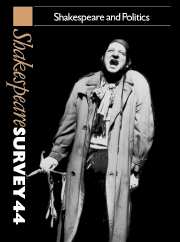Book contents
- Frontmatter
- Shakespeare and Politics
- Language, Politics, and Poverty in Shakespearian Drama
- Some Versions of Coup d’état, Rebellion and Revolution
- Woman, Language, and History in The Rape of Lucrece
- Love in Venice
- Two Kingdoms for Half-a-Crown
- ‘Fashion it thus’: Julius Caesar and the Politics of Theatrical Representation
- ’Demystifying the Mystery of State’: King Lear and the World Upside Down
- Tragedy, King Lear, and the Politics of the Heart
- The Politics of Shakespeare Production
- Shakespeare in the Trenches
- Shakespeare’s Earliest Editor, Ralph Crane
- Shakespeare’s Falconry
- Telling the Story of Shakespeare’s Playhouse World
- Shakespeare Performances in England, 1989–90
- Professional Shakespeare Productions in the British Isles January-December 1989
- Critical Studies
- Shakespeare’s Life, Times, and Stage
- Editions and Textual Studies
- Books Received
- Index
Woman, Language, and History in The Rape of Lucrece
Published online by Cambridge University Press: 28 March 2007
- Frontmatter
- Shakespeare and Politics
- Language, Politics, and Poverty in Shakespearian Drama
- Some Versions of Coup d’état, Rebellion and Revolution
- Woman, Language, and History in The Rape of Lucrece
- Love in Venice
- Two Kingdoms for Half-a-Crown
- ‘Fashion it thus’: Julius Caesar and the Politics of Theatrical Representation
- ’Demystifying the Mystery of State’: King Lear and the World Upside Down
- Tragedy, King Lear, and the Politics of the Heart
- The Politics of Shakespeare Production
- Shakespeare in the Trenches
- Shakespeare’s Earliest Editor, Ralph Crane
- Shakespeare’s Falconry
- Telling the Story of Shakespeare’s Playhouse World
- Shakespeare Performances in England, 1989–90
- Professional Shakespeare Productions in the British Isles January-December 1989
- Critical Studies
- Shakespeare’s Life, Times, and Stage
- Editions and Textual Studies
- Books Received
- Index
Summary
Recent feminist criticism of Shakespeare’s The Rape of Lucrece (or Lucrece , as it was titled in its first five quartos) has stressed the extent to which the idea of woman which it represents is one overdetermined by patriarchal ideology, and has typically interpreted Lucrece herself as a sign used to mediate and define men’s relationships to men. While I am partially in agreement with such interpretations of the poem, I want here to question the view that at no point in the poem is Lucrece represented as posing any contradiction, any aporia, within patriarchal discourse. Nancy Vickers, in her celebrated essay, “‘The blazon of sweet beauty’s best”: Shakespeare’s Lucrece’, argues that:
In Lucrece occasion, rhetoric, and result are all informed by, and thus inscribe, a battle between men that is first figuratively and then literally fought on the fields of woman’s ‘celebrated’ body. Here, metaphors commonly read as signs of a battle between the sexes emerge rather from a homosocial struggle, in this case a male rivalry, which positions a third (female) term in a median space from which it is initially used and finally eliminated.
Of course Vickers is right in her assertion that Lucrece, as a third and female term, occupies 'a median space' in the poem. She identifies this inbetween space with Lucrece's body (as Georgianna Ziegler has recently pointed out, this space is also the private domestic space associated with female identity by patriarchal culture). Lucrece's body does indeed begin and end the poem as the object of masculine rhetoric. None the less, it is strange that Vickers, in focusing her influential feminist analysis upon men's use and abuse of language in Shakespeare's poem, failed to discuss Lucrece's own language — her speech at her death, and her more private but much longer rhetorical performance, in the privacy of her chamber, immediately before and after her rape. For Lucrece's 'inbetweenness' can also be related to the importance which her voice assumes at the dead centre of the poem, in a textually constituted space which corresponds to the very depths of night according to Shakespeare's narrative.
- Type
- Chapter
- Information
- Shakespeare Survey , pp. 33 - 40Publisher: Cambridge University PressPrint publication year: 1991
- 4
- Cited by

